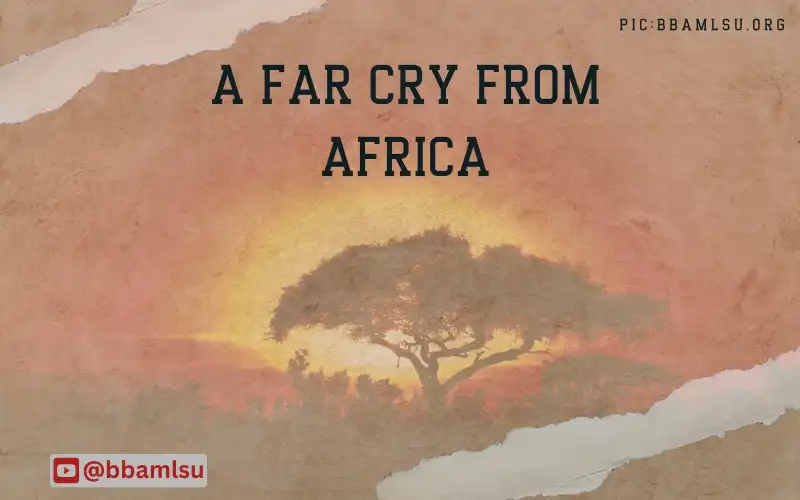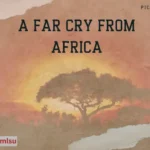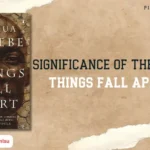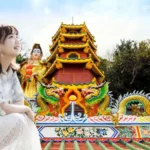Chinua Achebe’s novel Things Fall Apart is a seminal work that explores the profound cultural and social upheavals faced by the Igbo society in Nigeria at the cusp of colonial rule.
The title of the novel, drawn from W.B. Yeats’s poem “The Second Coming,” holds deep significance and encapsulates the thematic essence of the story.
The phrase “things fall apart” suggests a disintegration of order and stability, and this concept is central to the narrative of the novel.
To understand the full impact of the title, it is essential to delve into its various connotations and its relation to the characters, culture, and broader themes within the novel.

Yeats’s Influence and the Notion of Disintegration
The title Things Fall Apart is a direct reference to Yeats’s poem, specifically the lines:
“Turning and turning in the widening gyre
The falcon cannot hear the falconer;
Things fall apart; the centre cannot hold;
Mere anarchy is loosed upon the world” (Yeats).
These lines convey a sense of chaos and loss of control, depicting a world where established norms and orders are breaking down.
Achebe uses this notion of disintegration to frame the collapse of traditional Igbo society under the pressures of colonialism and missionary influence.
The imagery of a center that cannot hold aptly describes the destabilization of the communal and cultural structures that defined the Igbo way of life.
Cultural and Social Disintegration
At the heart of Things Fall Apart is the story of Okonkwo, a respected warrior and leader in the Umuofia clan, who embodies the values of traditional Igbo culture.
The novel meticulously details the customs, rituals, and social hierarchy of the Igbo people, establishing a vibrant and cohesive community.
However, with the arrival of European missionaries and colonial administrators, this cultural fabric begins to unravel.
The title signifies the disintegration of the Igbo culture in multiple ways:
1. Disruption of Social Structures:
The introduction of new religious beliefs and administrative practices by the Europeans leads to a breakdown of traditional social roles and structures.
The Christian missionaries attract converts from marginalized groups within the society, which creates divisions and weakens the communal bonds that once held the clan together. As noted in the novel:
“The white man is very clever. He came quietly and peaceably with his religion. We were amused at his foolishness and allowed him to stay. Now he has won our brothers, and our clan can no longer act like one. He has put a knife on the things that held us together and we have fallen apart” (Achebe, Chapter 20).
2. Collapse of Traditional Authority:
The arrival of the Europeans also undermines the authority of traditional leaders and institutions. Okonkwo, who prides himself on his adherence to traditional values and his role as a leader, finds himself increasingly powerless in the face of the new order imposed by the colonizers.
The once unchallenged authority of the elders and the spiritual significance of the Oracle are diminished, leading to a loss of cohesion and direction within the society.
3. Erosion of Cultural Identity:
The imposition of Western cultural values and the introduction of a foreign legal and educational system lead to a gradual erosion of Igbo cultural identity. The younger generation, particularly those who convert to Christianity or seek Western education, become estranged from their cultural roots.
This shift is poignantly captured in the narrative through the character of Nwoye, Okonkwo’s son, who abandons his father’s beliefs and embraces Christianity:
“He [Nwoye] felt a relief within as the hymn poured into his parched soul. The words of the hymn were like the drops of frozen rain melting on the dry palate of the panting earth” (Achebe, Chapter 16).
Personal and Familial Disintegration
The title Things Fall Apart also reflects the personal tragedies and internal conflicts experienced by Okonkwo. His rigid adherence to traditional ideals and his fear of being perceived as weak drive him to actions that alienate him from his family and community.
His inability to adapt to the changing world around him leads to his ultimate downfall. Okonkwo’s life becomes a microcosm of the broader disintegration happening within his society. His tragic end, symbolized by his suicide, signifies the complete collapse of his personal world:
“Okonkwo’s life had been ruled by a great passion—to become one of the lords of the clan. That had been his life-spring. And he had all but achieved it. Then everything had been broken. He had been cast out of his clan like a fish onto a dry, sandy beach, panting” (Achebe, Chapter 24).
Broader Colonial Impact
The title also hints at the broader implications of colonialism on indigenous cultures worldwide. Achebe’s narrative is not just a story of the Igbo people but a commentary on the destructive impact of colonialism on traditional societies.
The disintegration depicted in the novel mirrors the widespread cultural, social, and political upheavals experienced by colonized peoples. The fall of Umuofia symbolizes the loss of autonomy and the cultural subjugation that many indigenous communities faced under colonial rule.
Conclusion
The title Things Fall Apart serves as a profound metaphor for the themes of cultural disintegration, personal tragedy, and the broader impact of colonialism explored in Chinua Achebe’s novel.
It encapsulates the sense of loss, fragmentation, and the inevitable change that occurs when two fundamentally different worlds collide. Through the story of Okonkwo and the fate of the Igbo society, Achebe provides a poignant and powerful exploration of the complexities and consequences of cultural encounter and transformation.
The title, therefore, is not just a reflection of the narrative’s events but a deep commentary on the fragility of human societies and the enduring impact of historical forces.
The resonance of Things Fall Apart lies in its ability to convey the universal themes of change, loss, and the quest for identity amidst a rapidly transforming world.













